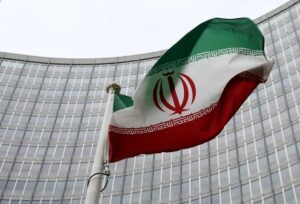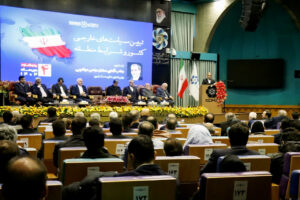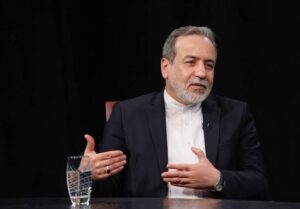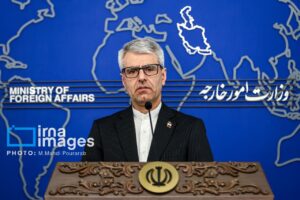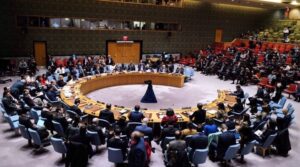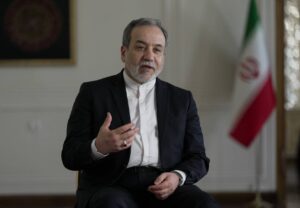The ministry issued the statement on Sunday, a day after the E3, namely France, Britain, and Germany, announced the reinstatement of six UNSC resolutions that had been terminated under the 2015 Iran nuclear deal – officially known as the Joint Comprehensive Plan of Action (JCPOA) – along with Resolution 2231, which endorsed the agreement.
The E3 said that the re-instatement took effect on September 27, 2025 “after completion of the snapback process as provided for in UN Security Council Resolution 2231.” They urged Iran and all states to “abide fully by” those six resolutions.
The following is the full text of the Iranian Foreign Ministry’s statement:
The Ministry of Foreign Affairs of the Islamic Republic of Iran considers the actions of the three European countries (Britain, Germany, and France) and the United States—which misused the dispute resolution mechanism provided for in the JCPOA and UN Security Council Resolution 2231 to reinstate previously terminated resolutions against Iran—to be illegal and unjustified. It emphasizes that Resolution 2231 and its associated restrictions regarding Iran’s peaceful nuclear program must be regarded as having expired on October 18, 2025.
The E3, under US provocation and pressure, triggered the so-called “snapback mechanism” even though they themselves, due to continuous and significant failures in fulfilling their commitments, have been in breach of their JCPOA commitments and have misused the agreement’s dispute-resolution process.
Moreover, by explicitly or implicitly supporting the US and Israeli regime’s military attacks against Iran’s peaceful nuclear facilities — facilities covered by the JCPOA and subject to IAEA safeguards — the three European countries have flagrantly violated international law and the NPT, in particular Article 2(4) of the UN Charter. By doing so, they have openly contravened both the JCPOA and UN Security Council Resolution 2231.
Accordingly, the European parties to the JCPOA, like the US, have acted in blatant bad faith, committing persistent and serious violations of both the letter and the spirit of the JCPOA, while making no genuine effort to resolve disputes in good faith. The attempt to revive terminated resolutions is not only legally baseless and unjustifiable, but also entirely unacceptable from moral and logical standpoints.
The peaceful nuclear program of the Islamic Republic of Iran has already been comprehensively addressed in UN Security Council Resolution 2231 and its annex, the JCPOA, whose 10-year term must be regarded as concluded on schedule, that is, October 18, 2025.
Furthermore, the E3 have failed to comply with the provisions of Resolution 2231 in pursuing this matter. Paragraph 11 of Resolution 2231 explicitly states that the Security Council must “take into account the views of the states concerned.” It is regrettable that, despite the clear positions of other JCPOA participants — namely Iran, China, and the Russian Federation — the Council’s president, under pressure from the E3 and the US, unlawfully put the draft resolution to a vote.
As emphasized in the joint letter of the Foreign Ministers of China, Iran, and Russia dated August 28, 2025, the Security Council cannot act on the basis of the flawed notification submitted by the E3. Any measure taken in violation of, or in contradiction to, UN Security Council Resolution 2231 cannot create legal obligations for UN member states.
Accordingly, the Islamic Republic of Iran rejects the claim by the E3 and the US regarding the reinstatement of previous resolutions—which were terminated pursuant to Resolution 2231 in 2015—and stresses that no obligations arise for UN member states, including Iran, with respect to the provisions or mechanisms of those rescinded resolutions. All countries must refrain from recognizing this unlawful situation, which is inconsistent with UNSC Resolution 2231.
The principled position of the Islamic Republic of Iran on this matter has been conveyed in detail in its official letter dated September 27, 2025 to the UN secretary-general. It must be recalled that over the past two decades, Iran has repeatedly demonstrated its commitment to dialogue and diplomacy in addressing issues raised about its peaceful nuclear program, and has consistently expressed its readiness to seek a logical and fair solution—one that safeguards the rights and interests of the Iranian people in the peaceful use of nuclear energy, while also providing the necessary transparency and assurances regarding the exclusively peaceful nature of Iran’s nuclear activities.
In this context, Iran not only fully implemented the provisions of the JCPOA from 2015 until 2019 (one year after the US’s unlawful withdrawal), but also calibrated its remedial measures under Articles 26 and 36 of the JCPOA, starting in May 2019, in a way that would allow for Iran’s immediate return to full compliance should the European parties and the US resume their own commitments.
Over the past four years, Iran has also put forward numerous initiatives and proposals for the full resumption of JCPOA commitments by all parties, or for the conclusion of a new, negotiated understanding to resolve outstanding issues related to Iran’s nuclear program. All of these, however, have failed due to the lack of seriousness and good faith on the part of the E3 or the US.
The military attacks by the Zionist regime and the US on Iran’s nuclear facilities during the period of 13–24 June 2025, and the E3’s alignment with the aggressors, represented the culmination of these three countries’ flagrant violation of their JCPOA obligations accompanied by manifest bad faith. There is no doubt that the criminal military aggression against Iran—which caused numerous Iranian citizens to be killed and wounded, and damaged nuclear facilities as well as certain critical national infrastructures—creates, in addition to the criminal responsibility of the perpetrators and their commanders, the international responsibility for the aggressor parties for having committed internationally wrongful acts. The Islamic Republic of Iran will use all available instruments to bring the criminals to justice and punish them, and to seek compensation.
Over the past two months, the Islamic Republic of Iran made extensive efforts to prevent the E3 from abusing the JCPOA dispute-resolution mechanism. A memorandum of understanding signed with the International Atomic Energy Agency on September 9, 2025, as well as submitting constructive and reasonable proposals in this regard and other issues related to Iran’s nuclear program were among those efforts. However, the efforts did not succeed because of lack of attention of the E3 and the US and their excessive demands. In fact, the E3 and the US chose a course of confrontation and crisis-making instead of creating the space needed for diplomacy and engagement, the three European countries and the United States, mistakenly believing that reviving the rescinded UN Security Council resolutions would provide them with a new lever of pressure. The Islamic Republic of Iran will vigorously defend Iran’s national rights and interests, and any move intended to harm the rights or interests of the Iranian people will be met with an appropriate and decisive response.

